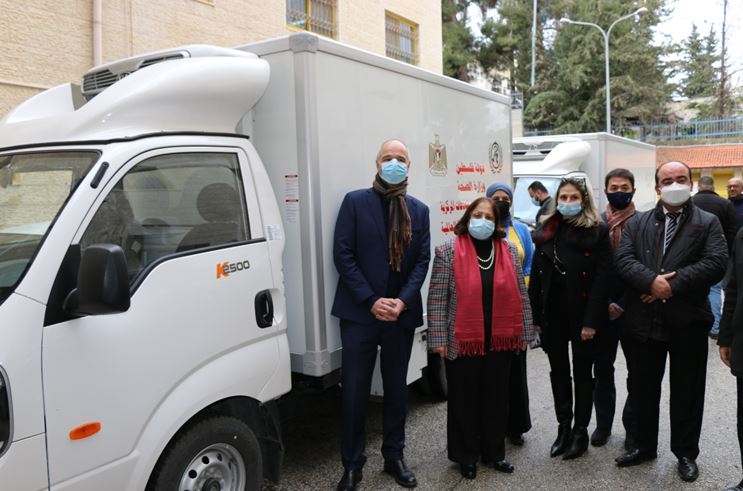
East Jerusalem/PNN/
WHO in oPT handed over two refrigerated vehicles worth US$ 93,000 to the Palestinian Ministry of Health (MOH) as part of its ongoing support to the health system and the national response to COVID-19.
The vehicles, funded by the Federal Republic of Germany, will bolster efforts to strengthen the vaccine cold chain to ensure that COVID-19 and other vaccines can be transported safely from the warehouse to health facilities across the Gaza Strip and West Bank.
The Palestinian Minster of Health Dr Mai Al-Keilahh “thanked the Federal Republic of Germany and the World Health Organization for supporting the Palestinian Health system, stressing that this support will help the Ministry of Health in combating COVID-19 and in continuing, with higher efficiency, the vaccination campaign all across Palestine”
Since March 2020, WHO in oPT has provided essential COVID-19 response equipment and supplies worth over US$ 18.5 million to the MoH across oPT.The COVID-19 response is helping to improve the resilience and preparedness of the overall health system too.
“Together with a continuing focus on other areas of the COVID-19 response such as testing, surveillance, case management, risk communication, and vaccination, in collaboration with the MOH, we are also investing in the vaccine cold chain. This is to not only boost COVID-19 vaccination efforts but also to improve the long-term sustainability of the larger immunization system of oPT”, said Dr. Richard Peeperkorn, WHO Representative in oPT.
Earlier this week, WHO in oPT also provided two glovebox machines worth approximately US$ 300,000, funded by the Norwegian Institute of Public Health, to the MOH to protect health workers from contamination and exposure while handling hazardous and potentially contagious biochemical materials.
The World Health Organization provides global leadership in public health within the United Nations system. Founded in 1948, WHO works with 194 Member States across six regions, to promote health, keep the world safe and serve the vulnerable. Our goal for 2019-2023 is to ensure that a billion more people have universal health coverage, to protect a billion more people from health emergencies, and provide a further billion people with better health and well-being.